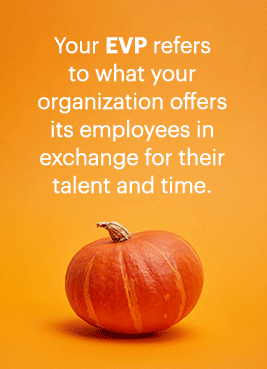Improve Your Employee Value Proposition
By Candace Fisher, SPHR, Director, Organizational Development/Certified Coach
Published November 1, 2022
Last Monday, while returning from a conference with a colleague, we stopped to have dinner at a restaurant with a fairly full parking lot. A gentleman walked up to our car and told us that, unless we’d come to carve pumpkins, we’d picked the wrong day. He explained that he was hosting a pumpkin carving evening for employees and their families, complete with pigs in a blanket and macaroni and cheese.
 The owner informed us that they used to be open every day of the week, but, like many employers, he was finding it impossible to fully staff his business. So now, rather than running with fewer staff on a shift or providing them less time off, he chose to close the restaurant two days a week. He told us, “My employees work when you play, and they need time with their families.” Just then, an employee and his child (in costume, of course!) walked by and the owner greeted them both by name and chatted for a moment. After politely declining his invitation to join them for pumpkin carving and dinner, we hit the road.
The owner informed us that they used to be open every day of the week, but, like many employers, he was finding it impossible to fully staff his business. So now, rather than running with fewer staff on a shift or providing them less time off, he chose to close the restaurant two days a week. He told us, “My employees work when you play, and they need time with their families.” Just then, an employee and his child (in costume, of course!) walked by and the owner greeted them both by name and chatted for a moment. After politely declining his invitation to join them for pumpkin carving and dinner, we hit the road.
My colleague and I were impressed by this business owner’s efforts to make lemonade from the lemons that the employment market has given him by enhancing the company’s EVP (Employee Value Proposition):
He was showing his employees that he cared about them by ensuring that they had time off to rest. He was creating a culture of care by investing in a family-friendly event for employees to gather and have some fun with their own little ghosts, witches, or superheroes.
Your EVP refers to what your organization offers its employees in exchange for their talent and time. This certainly includes salary and benefits, but for employees, it has become more. In addition to the lemonade recipe above, consider:
- Employees want to be given growth and development opportunities.
- People want supervisors and management to care about them as individuals, not just as workers who contribute to the bottom line.
- Supervisors should meet frequently with employees to provide feedback – and to listen to their ideas and address their needs.
- Organizations need to communicate frequently and as openly and transparently as possible.
- People value having control over their time, so allow flexibility in work location and schedule when possible.
- Employees want to work for an organization with values in line with their own. And remember, values are more than words on a poster.
The owner we interacted with was doing some of the right things to enhance his restaurant’s EVP. What is your organization doing to improve your EVP and to make your workplace attractive to current – and prospective – employees? Employees who leave will almost always tell you that it’s for a better opportunity or a salary increase. Of course, who would leave for a worse opportunity or a pay cut? But it’s important to back up a step or two and ask, “What made them start looking in the first place?”